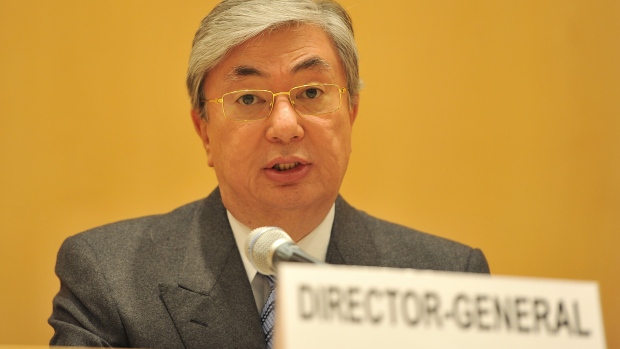Mar 20, 2019
Soviet-Era Ruler Hands Off Kazakh Presidency to Protect Legacy
, Bloomberg News

(Bloomberg) -- Kazakhstan began a new political era, at least formally, as Kassym-Jomart Tokayev was sworn in as president on Wednesday, succeeding leader-for-life Nursultan Nazarbayev.
The handover signals the start of a long-forecast transfer of power in central Asia’s largest energy producer that Nazarbayev has ruled since 1989. While he’s no longer president, he retains considerable influence as lifetime head of the Kazakh security council with authority to issue executive orders to state bodies. Lawmakers also made Nazarbayev, 78, leader of the nation for life in 2010 in the country sandwiched between Russia and China.
“Nazarbayev has stepped down, of course, but he’s not going very far,” said Konstantin Kostin, a political analyst in Moscow.
In his inauguration speech, Tokayev proposed renaming Astana, the capital, as Nursultan.
Nazarbayev, the region’s last Soviet-era leader, received a standing ovation at a joint session of parliament called to swear in Tokayev, 65, who became only the second Kazakh president since independence in 1991. Elections are scheduled for 2020.
While the central bank said it saw no reason for the tenge to decline, demand for dollars in the morning trading session in Almaty, the financial capital, jumped about five-fold compared to the average volume so far this year. The currency was down by 0.6 percent to 378.55 against the dollar at 12:03 p.m. in Astana.
Tokayev, a former prime minister and career diplomat who speaks English, Russian and Chinese, was in line under the constitution to succeed Nazarbayev as chairman of the Kazakh Senate since 2013. With Russia and China monitoring developments, analysts speculated over how long he may remain as president.
Nazarbayev wants to become a Kazakh version of Singapore’s late founding leader Lee Kuan Yew, Alexander Gabuev, senior fellow at the Moscow Carnegie Center, wrote on Twitter. Tokayev is among his most trusted allies and “unlikely to pose a challenge to Nazarbayev’s grip on real power in the future,” he said.
While Nazarbayev has previously ruled out handing power to one of his three daughters, the family remains influential in Kazakhstan. Nazarbayev’s eldest daughter, Dariga, is a prominent senator and another daughter Dinara controls Halyk Bank, the nation’s biggest lender, with her husband, Timur Kulibayev.
His departure from the presidency “does not signal a full succession of power at this time,” Eurasia Group analysts Zachary Witlin and Alex Brideau wrote in a note. “The key signpost will be whether Nazarbayev remains de facto president but from a role further from the public eye, or if he takes a hands-off approach and focuses on managing competitors to the role of president or other influential posts.”
Nazarbayev announced his resignation less than a month after he dismissed the government and demanded sweeping changes to improve living standards, including trillions of tenge in additional spending. The central bank governor also stepped down and lawmakers unanimously appointed Nazarbayev’s nominee to head the regulator.
To contact the reporter on this story: Nariman Gizitdinov in Almaty at ngizitdinov@bloomberg.net
To contact the editors responsible for this story: Torrey Clark at tclark8@bloomberg.net, Tony Halpin
©2019 Bloomberg L.P.


